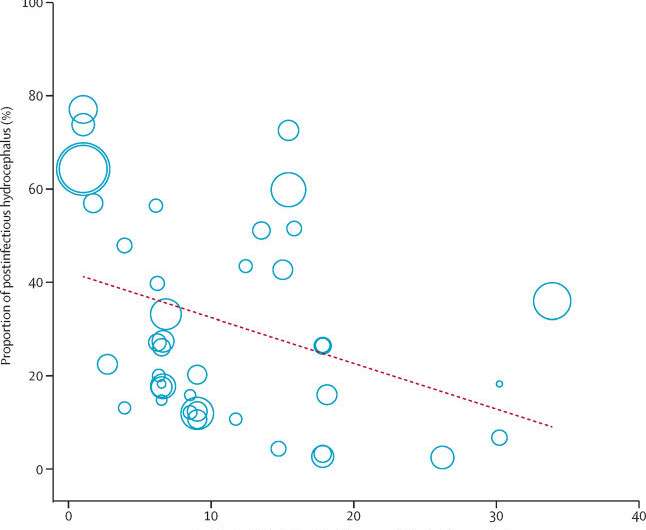New study shows that infections are the main cause of hydrocephalus in African children

In a systematic review in The Lancet Global Health, Ph.D.-student Camilla Grøver Aukrust and colleagues have studied the causes of hydrocephalus in African children.
"Hydrocephalus is a disease that affects children, and which we know can lead to serious cognitive issues or death," says Camilla Grøver Aukrust, nurse and Ph.D. research fellow at the Department of Community Medicine and Global Health at the University of Oslo.
In a new study, Aukrust and colleagues have mapped the causes of and diagnostic methods for hydrocephalus in children under the age of 18 from Africa. Being able to identify the causes of the disease is crucial to prevent hydrocephalus.
"We wanted to study two things, the main reason why children get hydrocephalus and the methods used to diagnose the disease," Aukrust says. "The study is the result of the pandemic. I was supposed to go on fieldwork on March 13, 2020, but I did not. So I decided to do a systematic review."
The article "Aetiology and diagnostics of paediatric hydrocephalus across Africa: a systematic review and meta-analysis" was first published on November 15, 2022 in The Lancet Global Health.
Infections are the main cause of hydrocephalus in African children
"Children with hydrocephalus get too much brain fluid in their heads, causing the heads of the smallest children to grow. This gives the characteristic, large heads, which are often associated with the disease," Aukrust says. Other symptoms can be that the children become irritable and do not feed properly.
About 400,000 children in the world get hydrocephalus every year. Around half of these are from Africa, where the disease is considered a public health problem.
"Our study shows that infections are the main cause of hydrocephalus in African children," Aukrust says. In Norway, the U.S. and other Western countries, however, the most common cause of hydrocephalus is cerebral hemorrhage in premature children.
"We also found more cases of post-infectious hydrocephalus in low-income countries, and in the countries closest to the equator."
This suggests that there are several non-biological and non-medical causes of hydrocephalus that contribute to the uneven distribution of the disease worldwide, which it is important to trace in order to improve treatment offered for the disease.
"This also shows that it can be useful to introduce targeted measures in affected areas, to prevent hydrocephalus," Aukrust says.
Neurosurgery is the only treatment for hydrocephalus
"The neurosurgical services offered are limited in large parts of Africa, leading to children receiving late and inadequate treatment," Aukrust says. Without treatment, hydrocephalus can lead to neurological damage, which can affect the quality of life or be fatal.
"In theory, hydrocephalus caused by infections can be prevented and treated with antibiotics. That would be great, because neurosurgery and treatment can be demanding and complicated, and lead to lifelong treatment," Aukrust says. It is common for the patients having to go through several rounds of surgical treatment.
"It is important to introduce measures to improve the health of both mothers and children, so that the mother do not get infections during pregnancy or after birth, which in turn can lead to hydrocephalus in children," Aukrust explains.
Researchers want to find viruses and bacteria that cause hydrocephalus
"Today, researchers are working on finding pathogens, bacteria or viruses, that causes hydrocephalus," Aukrust says.
Recently, researchers at a hospital in Mbale, Uganda, have found a pathogen, which they believe causes hydrocephalus in children at the center. Aukrust explains that the cause of the disease may be other viruses or bacteria in other African countries.
"If we don't know what causes hydrocephalus or how the children become infected, it is difficult to prevent," Aukrust says. Preventive measures in low-income areas with many cases of hydrocephalus will help reduce serious brain injuries caused by the disease, as seen in Western countries.
A systematic, interdisciplinary review
The study involved an interdisciplinary, systematic review, that consisted of a literature review and a meta-analysis.
Working with Aukrust on the study were professor and senior consultant neurosurgeon Per Kristian Eide at UiO, Anne Henriette Paulsen, doctor and Ph.D. from Sjåk, Enoch Ogbonnaya Uche, professor of neurosurgery at the University of Nigeria, neurosurgeon Patrick Djona Kamalo from Queen Elizabeth Central Hospital in Malawi, Heidi Fjeld, professor and medical anthropologist at UiO, biostatistician Irene Sandven at Oslo University Hospital, and librarian Hilde Strømme at the Medical Library at UiO.
By the help of a librarian from UiO, the researchers did a wide literature search, without any restrictions on year or country in Africa.
"We did a broad literature search, without limitations on time or language, and included 38 studies, from 18 African countries with a total of around 6,500 children. Several studies were published in African journals," Aukrust says.
The researchers ranked the methodological quality of the included studies from low to high quality. The quality studies showed a higher frequency of the post-infectious form of hydrocephalus. This may indicate that these studies are better at capturing this form of hydrocephalus.
"In a large proportion of the studies, the cause of hydrocephalus was not known. This shows that we need better and more studies on the topic," Aukrust concludes.
In the same issue of The Lancet Global Health, the results of the study are praised by Dr. Benjamin C. Warf from Harvard Medical School and Boston Children's Hospital, who writes that the study shows that post-infectious hydrocephalus in newborns is a condition of poverty, but also a condition that can be prevented and treated.
More information: Camilla G Aukrust et al, Aetiology and diagnostics of paediatric hydrocephalus across Africa: a systematic review and meta-analysis, The Lancet Global Health (2022). DOI: 10.1016/S2214-109X(22)00430-2


















